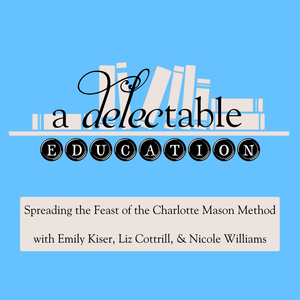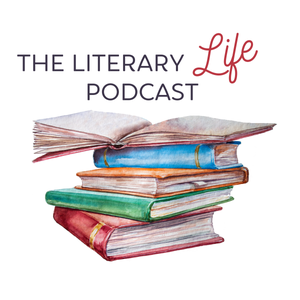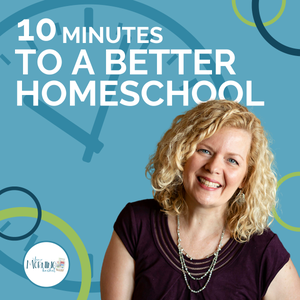
A Delectable Education Charlotte Mason Podcast
Liz Cottrill, Emily Kiser and Nicole Williams
Spreading the Feast of the Charlotte Mason Method
- 47 minutes 42 secondsEpisode 293: Voices from the Conference: Homeschooling Around and Through Major Transitions with LaShawne Thomas
In today's podcast episode, we bring you a session from the 2024 ADE at HOME {Virtual} Conference. LaShawne Thomas presented a session full of ideas and possibilities for navigating homeschooling when seasons of transition arise (and sometimes hang around) in our lives. A long-time Charlotte Mason educator and former Navy wife, LaShawne has experienced her fair share of upheavals and transitions and has much wisdom to share with us.
Our Country and Its People, Monroe & Buckbee
Strayer-Upton Practical Arithmetic
ADE at HOME 2025 {Virtual} Conference
Living Book Press -- Our Season Sponsor
Simply Charlotte Mason's Elementary Arithmetic Series
ADE's Patreon Community
17 January 2025, 7:00 am - 43 minutes 18 secondsEpisode 292: Balancing Time--School Schedules
This week on the podcast, we are discussing the principles behind Charlotte Mason's School Schedules. First we look at the whole year's schedule, why three terms, and options we have for today's students. Then, we turn our focus to the daily schedule and how we can bring much needed balance to our education. We hope you take away principles, rather than rules, and gain clarity on how our seemingly mundane choices have such a large impact on our students.
“It is impossible to overstate the importance of this habit of attention. It is, ..., ‘within the reach of everyone, and should be made the primary object of all mental discipline’; for whatever the natural gifts of the child, it is only so far as the habit of attention is cultivated in him that he is able to make use of them.” (1/146)
“...if the [student] is to get two or three hours intact [in the afternoon], she will owe it to her mother's firmness as much as to her good management. In the first place, that the school tasks be done, and done well, in the assigned time, should be a most fixed law. The young people will maintain that it is impossible, but let the mother insist; she will thereby cultivate the habit of attention." (5/195)
“It is well to make up our mind that there is always a next thing to be done, whether in work or play; and that the next thing, be it ever so trifling, is the right thing; not so much for its own sake, perhaps, as because, each time we insist upon ourselves doing the next thing, we gain power in the management of that unruly filly, Inclination. …
"At first it requires attention and thought. But mind and body get into the way of doing most things; and the person, whose mind has the habit of singling out the important things and doing them first, saves much annoyance to himself and others, and has gained in Integrity. ...
"In the end, integrity makes for gaiety, because the person who is honest about his work has time to play, and is not secretly vexed by the remembrance of things left undone or ill done.” (4-1/171-2)
The Anxious Generation, Jonathan Haidt
(Contains affiliate links)
ADE at HOME 2025 {Virtual} Conference
Episode 82 on Holiday Pursuits and Activities
Episode 287: Finding Balance in Life with Michelle Reisgraf
The Parents' Educational Course List
3 January 2025, 7:00 am - 23 minutes 46 secondsEpisode 291: Finding Balance in High School and Beyond with Helen Swaveley
This season, as we explore finding balance in the Charlotte Mason Method, we are interviewing people who have been able to find balance in their various contexts. This episode is an interview with Helen Swaveley, a seasoned home-educating parent, as she offers her perspective on how the Charlotte Mason's method gives balance to our students in high school and beyond.
A Tale of Two Cities, Charles Dickens
ADE at HOME {Virtual} Conference 2025
www.livingbookpress.com Use code "delectable" at check out to receive 10% off your order
ADE's Teacher Training Videos
ADE's Patreon Community
20 December 2024, 7:00 am - 45 minutes 37 secondsEpisode 290: Bringing Older Children into the CM Method
This Charlotte Mason podcast episode is a re-aired, re-visit to a common question we receive: bringing children into the Mason method from previous school experiences. What are the approaches that help children of various ages transition, what are realistic expectations, and how do we help them adjust to a different way of doing lessons?
"The success of such a school demands rare qualities in the teacher––high culture, some knowledge of psychology and of the art of education; intense sympathy with the children, much tact, much common sense, much common information, much 'joyousness of nature,' and much governing power..." (Vol. 1, p. 178)
"Our aim in Education is to give a Full Life.––We begin to see what we want. Children make large demands upon us. We owe it to them to initiate an immense number of interests. Thou hast set my feet in a large room; should be the glad cry of every intelligent soul. Life should be all living, and not merely a tedious passing of time; not all doing or all feeling or all thinking––the strain would be too great––but, all living; that is to say, we should be in touch wherever we go, whatever we hear, whatever we see, with some manner of vital interest. We cannot give the children these interests; we prefer that they should never say they have learned botany or conchology, geology or astronomy. The question is not,––how much does the youth know? when he has finished his education––but how much does he care? and about how many orders of things does he care? In fact, how large is the room in which he finds his feet set? and, therefore, how full is the life he has before him?" (Vol. 3, p. 170-171)
(Contains affiliate links)
ADE at HOME 2025 {Virtual} Conference
6 December 2024, 6:00 am - 1 hour 5 minutesEpisode 289: CM Graduate Panel with Jono Kiser
A perennial question those interested in the Charlotte Mason Method want to find out is how children raised in the method fare as they move on from homeschooling. At the 2024 ADE at HOME {Virtual} Conference Jono Kiser talked with three former CM students about their adjustment and experience. We bring you the audio from this interview as part of our occasional Voices of the Conference series.
Much Ado about Nothing, Shakespeare
The Winter's Tale, Shakespeare
The Elements of Style, Strunk & White
ADE at HOME 2025 {Virtual} Conference
Living Book Press -- Our Season Sponsor
ADE's Patreon Community
15 November 2024, 6:00 am - 35 minutes 6 secondsEpisode 288: Finding Balance for Our Student
The Charlotte Mason Method is an all-encompassing method of education for all of life, and therefore, there are many ways we can fall out of balance as we apply it in our homes and schools. Today, we are discussing the pitfalls of imbalance we face as relates to our students doing the work of their education. We discuss finding the balance between challenging our students but not pushing them, how the wide curriculum meets them where they are at without pigeonholing them, and how we teachers must practice Masterly Inactivity to allow them to do the work of their own education.
“A Code of Education in the Gospels, expressly laid down by Christ. It is summed up in three commandments … Take heed that ye OFFEND not––DESPISE not––HINDER not––one of these little ones.” (1/12)
“Therefore we do not feel it is lawful in the early days of a child's life to select certain subjects for his education to the exclusion of others; … but we endeavour that he shall have relations of pleasure and intimacy established with as many as possible of the interests proper to him; not learning a slight or incomplete smattering about this or that subject, but plunging into vital knowledge, with a great field before him which in all his life he will not be able to explore.” (3/223)
“Our deadly error is to suppose that we are his showman to the universe; and, not only so, but that there is no community at all between child and universe unless such as we choose to set up.” (3/188)
Living Book Press -- Our Season Sponsor: Secrets of the Universe
Awaken: A Living Books Conference -- April 4-5, 2025
Episode 204, which covers Points 9 & 10 of CM's Short Synopsis
Episode 266: The Unity of the Charlotte Mason Method: How a CM Curriculum is a cohesive whole
Episode 286: Finding Balance in Our Teaching
ADE at HOME 2025 {Virtual} Conference
Episode 108: Masterly Inactivity
ADE's Patreon Community
1 November 2024, 6:00 am - 1 hour 8 minutesEpisode 287: Balance in Life with Michelle Riesgraf
This season, as we explore finding balance in the Charlotte Mason Method, we are interviewing people who have been able to find balance in their various contexts. This episode is an interview with Michelle Riesgraf to learn how she balances her very full life as CM homeschooling mom and wife with all her other duties with her family serving inner-city kids on a working farm. While she shares specific challenges of her farming life, Michelle offers wisdom for us all in parenting, educating (and choosing co-ops), and living as the born persons we all are.
For the Children's Sake, Susan Schaeffer Macaulay
www.livingbookpress.com Use code "delectable" at check out to receive 10% off your order
ADE's Teacher Helps
ADE's Patreon Community
18 October 2024, 6:00 am - 39 minutes 20 secondsEpisode 286: Finding Balance in Our Teaching
The Charlotte Mason Method is an all-encompassing method of education for all of life, and therefore, there are many ways we can fall out of balance as we apply it in our homes and schools. Today, we are discussing the pitfalls of imbalance we face as relates to our teaching. From how we ourselves learn about the method, to combining multiple students; helping our students become more independent or making modifications for individual students. Miss Mason has timeless wisdom to offer us, and she knows we are equipped as mothers to be the primary agent of education for our children.
"The mother is qualified," says Pestalozzi, "and qualified by the Creator Himself, to become the principal agent in the development of her child..." (1/2)
"N.B. 1. — In home schoolrooms where there are children in A as well as in B, both forms may work together, doing the work of A or B as they are able." (P.U.S. Programmes)
"...so soon as the child can read at all, he should read for himself, and to himself..." (1/227)
"You may bring your horse to the water, but you can't make him drink ; and you may present ideas of the fittest to the mind of the child ; but you do not know in the least which he will take, and which he will reject." (2/127)
"The teacher's part is, in the first place, to see what is to be done, to look over the work of the day in advance and see what mental discipline, as well as what vital knowledge, this and that lesson afford; and then to set such questions and such tasks as shall give full scope to his pupils' mental activity." (3/180-181)
"Meantime , we sometimes err, I think, in taking a part for the whole, and a part of a part for the whole of that part." (3/148-149)
Living Book Press' Charlotte Mason Volumes
Living Book Press -- Our Season Sponsor
Episode 82 -- CM's thought on Holidays
Read-Aloud Revival Episode with Dr. Pakaluk
Episode 4: -- Three Tools of Education
ADE's Patreon Community
4 October 2024, 6:00 am - 24 minutes 38 secondsEpisode 285: Finding Balance in Ministry with Susanne Norris
This season, as we explore finding balance in the Charlotte Mason Method, we are interviewing people who have been able to find balance in their various contexts. This episode is an interview with Susanne Norris, a full-time homeschool mom and missionary. She has wise words to share with all of us, even if we're not in full-time ministry!
www.livingbookpress.com Use code "delectable" at check out to receive 10% off your order
ADE's Teacher Training Videos
ADE's Patreon Community
20 September 2024, 6:00 am - 42 minutes 6 secondsEpisode 284: Balancing Parent-Child Relationships
One of the distinctives of the Charlotte Mason Method is that it is relational education. The Method also applies to all of life, and so we start with the foundational relationship in our students' lives: their relationship with their parents. In this episode of the podcast, we look at the two extremes, and learn from Charlotte Mason how to strike a balance that leads to life--for both parent and child.
School Education, Volume 3 of the Home Education Series by Charlotte M. Mason, chapters 1-3
"...it is far easier to govern from a height, as it were, than from the intimacy of close personal contact. But you cannot be quite frank and easy with beings who are obviously of a higher and of another order than yourself." (3/4)
"Parents and teachers, because their subjects are so docile and so feeble, are tempted more than others to the arbitrary temper..." (3/11)
"Autocracy is defined as independent or self-derived power...Autocracy has ever a drastic penal code, whether in the kingdom, the school, or the family. It has, too, many commandments. 'Thou shalt' and 'thou shalt not' ... The tendency to assume self-derived power is common to us all, even the meekest of us, and calls for special watchfulness; the more so, because it shows itself fully as often in remitting duties and in granting indulgences as in inflicting punishments." (3/15-16)
"Locke promulgated the doctrine of the infallible reason. That doctrine accepted, individual reason becomes the ultimate authority, and every man is free to do that which is right in his own eyes...the principle of the infallible reason is directly antagonistic to the idea of authority." (3/5-6)
"[B]ut wise parents steer a middle course. They are careful to form habits upon which the routine of life runs easily, and, when the exceptional event requires a new regulation, they may make casual mention of their reasons for having so and so done ; or, if this is not convenient and the case is a trying one, they give the children the reason for all obedience-"for this is right." In a word, authority avoids, so far as may be, giving cause of offence." (3/22)
"[A]uthority is vested in the office and not in the person; that the moment it is treated as a personal attribute it is forfeited. We know that a person in authority is a person authorised ; and that he who is authorised is under authority." (3/12)
"Authority is neither harsh nor indulgent. She is gentle and easy to be entreated in all matters immaterial, just because she is immovable in matters of real importance; for these, there is always a fixed principle. It does not, for example, rest with parents and teachers to dally with questions affecting either the health or the duty of their children. They have no authority to allow children in indulgences... Authority is alert; she knows all that is going on and is aware of tendencies...It sometimes happens that children, and not their parents, have right on their side: a claim may be made or an injunction resisted, and the children are in opposition to parent or teacher. It is well for the latter to get the habit of swiftly and imperceptibly reviewing the situation; possibly, the children may be in the right, and the parent may gather up his wits in time to yield the point graciously and send the little rebels away in a glow of love and loyalty." (3/17)
"Authority is that aspect of love which parents present to their children; parents know it is love, because to them it means continual self-denial, self-repression, self-sacrifice: children recognise it as love, because to them it means quiet rest and gaiety of heart." (3/24)
"The constraining power should be present, but passive, so that the child may not feel himself hemmed in without choice. That free-will of man, which has for ages exercised faithful souls who would prefer to be compelled into all righteousness and obedience, is after all a pattern for parents. The child who is good because he must be so, loses in power of initiative more than he gains in seemly behaviour. Every time a child feels that he chooses to obey of his own accord, his power of initiative is strengthened." (3/31)
"We shall give children space to develop on the lines of their own characters in all right ways, and shall know how to intervene effectually to prevent those errors which, also, are proper to their individual characters." (3/35)
"'Wise passiveness.' It indicates the power to act, the desire to act, and the insight and self-restraint which forbid action. But there is, from our point of view at any rate, a further idea conveyed in 'masterly inactivity.' The mastery is not over ourselves only; there is also a sense of authority, which our children should be as much aware of when it is inactive as when they are doing our bidding." (3/28)
"Further, though the emancipation of the children is gradual, they acquiring day by day more of the art and science of self-government, yet there comes a day when the parents, right to rule is over; there is nothing left for them but to abdicate gracefully, and leave their grown-up sons and daughters free agents, even though these still live at home; and although, in the eyes of their parents, they are not fit to be trusted with the ordering of themselves: if they fail in such self-ordering, whether as regards time, occupations, money, friends, most likely their parents are to blame for not having introduced them by degrees to the full liberty which is their right as men and women. Anyway, it is too late now to keep them in training; fit or unfit, they must hold the rudder for themselves." (2/17)
Living Book Press' Charlotte Mason Volumes
Living Book Press -- Our Season Sponsor
Episode 115: Authority and Docility, Part 1
Episode 116: Authority and Docility, Part 2
Episode 201: Short Synopsis Points 1-4
ADE's Patreon Community
6 September 2024, 6:00 am - 36 minutes 59 secondsEpisode 283: Balancing Our Priorities
As we discuss ways to bring balance to our lives using the Charlotte Mason Method, our first focus is on our Priorities. We can fall off on either side of the horse: Making school all-important, or pushing it to the back burner. Miss Mason has excellent advice for how to avoid either extreme, and the ADE ladies share their own experiences with imbalance.
"...this is a delightful thing to remember, every time we do a thing helps to form the habit of doing it; and to do a thing a hundred times without missing a chance, makes the rest easy." (4/I/209)
"[H]e learns that one time is NOT 'as good as another;' that there is no right time left for what is not done in its own time..." (1/142)
Living Book Press' Charlotte Mason Volumes
Living Book Press -- Our Season Sponsor
ADE's Patreon Community
16 August 2024, 6:00 am - More Episodes? Get the App
Your feedback is valuable to us. Should you encounter any bugs, glitches, lack of functionality or other problems, please email us on [email protected] or join Moon.FM Telegram Group where you can talk directly to the dev team who are happy to answer any queries.
 Your Morning Basket
Your Morning Basket
 Simply Charlotte Mason Homeschooling
Simply Charlotte Mason Homeschooling
 The Literary Life Podcast
The Literary Life Podcast
 The New Mason Jar with Cindy Rollins
The New Mason Jar with Cindy Rollins
 Read-Aloud Revival ®
Read-Aloud Revival ®
 10 Minutes to a Better Homeschool
10 Minutes to a Better Homeschool